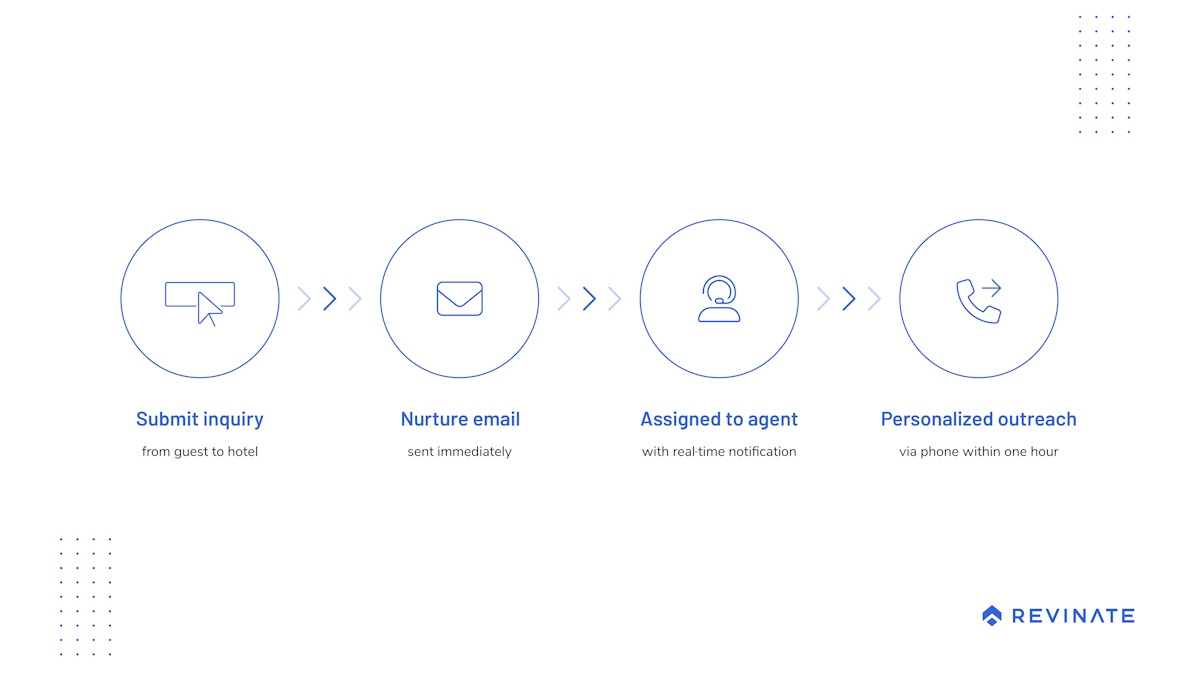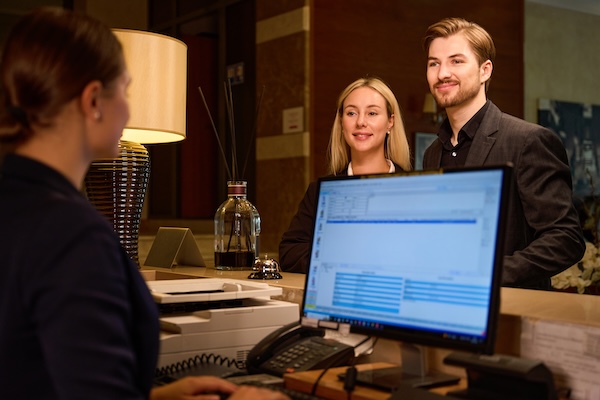Lead nurturing for hotels: From inquiry to confirmation
Lead nurturing for hotels: From inquiry to confirmation
You have revenue hiding in plain sight…and it’s slipping away.
Every year, hoteliers pour thousands into generating leads. You run ads. Your website converts. Your special offers land in inboxes. But here’s the brutal truth: most inquiries never become bookings.
Why? You’re missing the follow-through: lead nurturing.
Every guest contact with an email or phone number represents roughly $12 in potential value. But most slip away and book with an OTA instead. Not because your property isn’t a fit, but because you never gave them a reason to come back.
You send one promotional email or make one phone call. Then…silence. And you wonder why that prospect didn’t choose you.
Today’s travelers expect personalized attention at precisely the right moment through their preferred channel. A timely text. A thoughtful email with relevant info. A genuine conversation with someone who remembers their name.
Strategic hotel lead nurturing closes the gap between interest and revenue, transforming casual inquiries into committed stays. This guide will show you exactly how to make it happen for your property.
What is lead nurturing, and why does it matter so much?
Think of lead nurturing as the art of building relationships with potential guests through insightful, well-timed communications that guide them from “just browsing” to “booking confirmed.” It’s about blending smart technology solutions with genuine human connection.
Modern travelers now expect fast answers to their queries, and they’re increasingly interested in properties using AI to better tailor responses and services to their specific needs. But AI and automation alone won’t get you over the finish line. Your lead nurture strategy needs that human touch at the moments that matter most.
Why does nailing this process matter so much?
- It connects marketing to reservations: Your marketing team generates the buzz, but your reservation team closes the deal. Lead nurturing is the bridge that keeps inquiries from disappearing into the void between these departments.
- It protects your budget: Every unhandled inquiry is money down the drain. You paid to generate that lead – whether through an ad, social media campaign, or SEO investments – so letting it slip away because of weak follow-up means you’re essentially tossing marketing dollars in the trash.
- It builds direct relationships: Strong lead nurture practices turn curious shoppers into loyal guests who book direct and skip the OTAs. When you deliver personalized, attentive follow-up, customers feel valued and connected to your property. That relationship translates to higher lifetime value, repeat bookings, and guests who become advocates for your property.
Build an integrated lead handling workflow
Nurture leads effectively by building a workflow where nothing – and no one – slips through the cracks. The best hotel lead nurturing systems don’t operate in silos. They connect your digital inquiries, customer relationship management (CRM) system, and reservation team into one seamless operation.
The right tech ecosystem makes all the difference. When your customer data platform (CDP), marketing, and voice systems talk to each other, you get a unified view of guest profiles that include every interaction. No more “Hey, did anyone get back with that inquiry from Tuesday?” moments.
Here’s what works:
- Speed-to-lead is everything: Set up real-time notifications so your reservation agents know the instant a high-value inquiry comes in. Research shows you’re seven times more likely to qualify a lead when you respond within an hour of the initial query.
- Smart automation triggers: Configure your system to automatically tag inquiries based on guest type, booking window, purpose of stay, or lead source. A wedding inquiry needs different treatment than a last-minute weekend getaway.
- Intelligent routing: Route group and event inquiries to sales and leisure bookings to reservations, ensuring every lead reaches the right specialist instantly. Let your system automate the sorting so team members can focus on the conversation.
- Close the loop: Ensure every touchpoint feeds back into your CDP so call center agents and marketing have full context. Your agents need to see past interactions before they pick up the phone, and marketing needs to know when to pause automations or trigger the next nurture sequence.
Create effective handoff protocols
Here’s where many lead nurture efforts stumble: the handoff from marketing automation to human agents. You can have the slickest marketing automation in the world, but if the transition to your reservation team is delayed or feels clunky, you’ll lose bookings.
The key is creating crystal-clear protocols that everyone understands and follows. Start by defining your service level agreements (SLAs):
- Response time goals: How quickly should a live agent follow up after the automated sequence? Within an hour? Same business day? Be specific.
- Required fields: What information must be captured before handoff? Guest name, email, phone number, dates, room type preferences, and special requests are crucial.
- Handoff notes: Create a standardized format for notes. Your agent needs to know what emails a guest has received. Did they click anything? What pages did they visit? This makes each handoff feel effortless, and the guest experiences one continuous, personalized interaction.
A simple lead nurture workflow might look like this:f

Collaboration holds the key. Your automated marketing emails and texts warm up the lead and gather intelligence. Your reservation agents use that intel to tailor the conversation and close the booking. It’s teamwork, and both sides need to understand their role in your lead nurturing process.
Craft personalized nurture email, text, and call scripts
Not all inquiries are created equal, and your lead nurture messaging shouldn’t treat them that way. A corporate group booking inquiry needs a completely different approach than a family planning their summer vacation. The key is mapping your messaging to the inquiry type from the start.
Segment potential guests by intent:
- Room blocks and events: Focus on capacity, flexibility, and group amenities. Your call-to-action (CTA) might be “Schedule a site visit” or “Review our group rates.”
- Family vacations: Highlight kid-friendly amenities, dining options, and local attractions. CTA: “View family-friendly dates and rates.”
- Loyalty inquiries: Emphasize exclusive perks and recognition. CTA: “Unlock your member rate now.”
Match the message to the channel:
- Email: Warm and informative, visual, includes links and imagery. Example CTA: “We’d love to welcome you this spring! [View available rooms] or reply to this email with any questions.”
- SMS: Brief, urgent, action-oriented. Example CTA: “Sarah, your March dates are available! Ready to book? Reply YES or call Gill at [number].”
- Phone: Conversational, consultative, relationship-building. Use their name, reference their specific dates, address concerns in real time. Example CTA: “Hi Sarah, I’m calling about your March anniversary stay. I noticed you were interested in our spa. I’d love to walk you through a package that includes a couples massage.”
Build confidence with dynamic personalization: When guests see or hear their name, their exact dates, and messaging that reflects their specific travel purpose, they know you’re paying attention. This personal touch builds trust and confidence that they’re not just another transaction – you actually care about their stay.
Sample call script framework
Notice how the agent incorporates effective upselling techniques in hotel reservations below – the “Offer” adds genuine value while naturally increasing revenue.
Opening: “Hi Sarah, this is Gill from [Property Name]. I see you’re planning an anniversary stay March 15-17. Congratulations!”
Offer: “We have a beautiful king suite available with a balcony view, and I can include a complimentary bottle of champagne, chocolate-covered strawberries, and late checkout.”
Objection: “I understand you’re comparing a few properties. What matters most to you for this trip?” [Listen, then address]
Close: “I’d love to lock in these dates for you today. Can I go ahead and send over the reservation details?”
Implement lead scoring to prioritize follow-up
Your team can’t chase every inquiry with the same urgency. That’s where lead scoring comes in. Lead scoring is a system that assigns point values to inquiries based on specific criteria, helping you identify which prospects are most likely to book.
What makes a lead “hot?”
- Inquiry type: A 50-room corporate block scores higher than a single-night leisure booking.
- Travel dates: Peak season and high-demand dates (holidays, local events, graduation weekends) score higher than off-season inquiries.
- Booking window: Last-minute inquiries (within two weeks) to bookings 60 days out often signal high intent and convert better than those six or more months away.
- Engagement signals: Did they open your email? Click the virtual tour link? Visit your rates page three times? That’s buying behavior.
Once you’ve defined your scoring model, let automation do the heavy lifting. High-scoring leads trigger instant notifications to your top agents. Medium-scoring leads enter a nurture sequence. Low-scoring leads get educational content until they’re ready.
The payoff? Faster follow-up on high-value opportunities means higher conversion rates. Lead scoring ensures your best prospects never wait.
Measure success and optimize over time
The best lead nurturing systems aren’t “set it and forget it,” they’re constantly monitored and refined based on real performance data.
Track these key metrics:
- Inquiry-to-booking conversion rate: What percentage of inquiries turn into confirmed reservations? This is your North Star metric for hotel lead nurturing effectiveness.
- Average response time: How quickly are you making first contact? Remember, sub-one-hour response times dramatically boost conversions.
- Revenue per inquiry: Track the average revenue generated from each inquiry to understand true ROI.
- Campaign performance by inquiry source: Which channels drive the highest-quality leads? Double down on what works.
Don’t just collect data – act on it. Schedule quarterly audits of your workflows and scripts. Are certain lead nurture sequences outperforming others? Test new approaches, get rid of what doesn’t convert, and scale what does.
Hospitality-centric tools such as Revinate’s dashboard and reporting capabilities make this process easier, giving you real-time visibility into your entire lead nurturing funnel. You can spot bottlenecks, identify top performers, and optimize your lead nurturing strategy – all from one centralized view.
Modernize your lead nurturing system today
Ready to turn more inquiries into confirmed bookings? The Lead Nurture Campaigns track in Revinate’s Direct Booking Mastery Certification program gives you webinars, practical info, and actionable strategies to build a conversion-focused system that works. Stop leaving revenue on the table, and start nurturing leads like a pro.
Key Takeaways
- Lead nurturing is the bridge that connects your marketing efforts to actual bookings, and turns “just looking” into “just booked.”
- Speed wins: contact leads within an hour and you’re nearly seven times more likely to convert them than if you wait even 60 minutes longer.
- The best hotel lead nurturing systems don’t work in silos – they connect digital inquiries with your CDP, marketing, and voice channels so nothing falls through the cracks.
- Use lead scoring to focus your energy where it counts most: high-intent inquiries with the best chance of converting into revenue.
- Keep tabs on your inquiry-to-booking conversion rate, response times, revenue per inquiry, and channel performance, so you know what’s working and what needs fixing in your lead nurture strategy.
This site is protected by reCAPTCHA and the Google Privacy Policy and Terms of Service apply. View our Terms & Conditions here. *Required fields.





